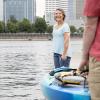



ABBOTT PARK, Ill., Sept. 27, 2017 /PRNewswire/ -- Abbott (NYSE: ABT) today announced that the U.S. Food and Drug Administration (FDA) has approved the FreeStyle® Libre Flash Glucose Monitoring System as a replacement1 for blood glucose monitoring (BGM) for adults with diabetes in the U.S. This revolutionary new glucose sensing technology eliminates the need for routine finger sticks1 and is the only personal continuous glucose monitor (CGM) that does not require finger stick calibration. Designed to be approachable, accessible and affordable for the 30 million people with diabetes in America6, the FreeStyle Libre system reads glucose levels through a sensor that is worn on the back of the upper arm for up to 10 days, making it the longest lasting personal glucose sensor available in the U.S.
The BGM replacement indication means that people with diabetes and their physicians can now make treatment decisions based on information from the FreeStyle Libre system, without the need for painful routine finger sticks1—and at a fraction of the cost of other CGM systems currently available7.
"Today, we are celebrating a breakthrough moment for people with diabetes in the U.S.—an end to the worry and hassles associated with routine finger sticks which have been the standard of glucose testing for more than 40 years," said Jared Watkin, senior vice president, Diabetes Care, Abbott. "At Abbott, we believe that FreeStyle Libre will transform diabetes management and we're proud to be at the forefront of innovation that empowers people to take control of their health to live their best lives."
HOW THE FREESTYLE LIBRE SYSTEM WORKS
With the FreeStyle Libre system, people with diabetes can:
- Self-apply the sensor, which is approximately the size of two stacked quarters, to the back of the upper arm.
- Capture real-time glucose readings with one-second painless scans of a small hand-held reader over the sensor.
- Identify glucose level trends (high, low, stable) with a directional arrow and review 8 hours of glucose history.
- Receive glucose readings through clothing,8 making testing more convenient and discreet9. The FreeStyle Libre sensor is also water-resistant10, and can be worn in the shower and during swimming.
- Avoid interference with acetaminophen, an active ingredient in more than 500 common over-the-counter medications, which can falsely raise reported glucose levels in certain CGMs to appear as if they are at dangerously high levels11.
With traditional BGM, some people with diabetes may have to finger stick up to 12 times per day12, to test their glucose levels, which only provides readings that represent distinct points in time. Studies have shown that a majority of people test less than three times per day because of the pain and hassles associated with finger sticks13. Without comprehensive glucose data, significant glucose fluctuations may be missed, which can lead to major health consequences14.
Even with current CGM devices, people still have to finger stick at least twice per day, based on their system, to calibrate their devices to ensure accuracy. However, the FreeStyle Libre system is factory calibrated so daily calibration is not required—another first in the personal glucose monitoring industry.
VISUALIZING DATA TO BETTER IDENTIFY TRENDS AND PATTERNS
The data from the FreeStyle Libre system provides a visual snapshot of a person's glucose fluctuations during a typical day, called an Ambulatory Glucose Profile (AGP). The AGP can reveal hypoglycemic (low blood sugar) and hyperglycemic (high blood sugar) trends intended to help facilitate better diabetes management15. By measuring, capturing and storing glucose level data continuously, patients and their doctors can see patterns over time and make adjustments to lifestyle, diet or treatment.
The importance of the AGP has been recognized by the American Association of Clinical Endocrinologists, which recently recommended that the health care industry standardize this report across all glucose monitoring devices so more physicians and patients will have access to this tool16.
STUDIES SHOW PEOPLE TEST MORE AND SPEND LESS TIME IN HYPOGLYCEMIA WITH THE FREESTYLE LIBRE SYSTEM
Two published clinical trials5,6 and real-world evidence17 from more than 50,000 FreeStyle Libre users show that people who use the FreeStyle Libre system test their glucose levels an average of at least 15 times per day. The studies show that people who scan more frequently spend less time in hypoglycemia or hyperglycemia while having improved average glucose levels, demonstrating improved glucose control overall.
"Diabetes management requires active participation by the patient. Regular monitoring of glucose levels is especially crucial among patients being treated with insulin," said Maria Tulpan, M.D., Lenox Hill Hospital, New York, N.Y. "What we see with the FreeStyle Libre system is patients gaining a better understanding of the impact of food, exercise and specific medications on their glucose levels due to availability of the data, which is important in the day-to-day management of diabetes and for behavioral changes towards improved diabetes control."
WHERE CAN YOU FIND THE FREESTYLE LIBRE SYSTEM
In the U.S., the FreeStyle Libre system will be available via prescription before the end of the year at major retail pharmacies. The FreeStyle Libre system is now being used by more than 400,000 people across approximately 40 countries18. To ensure accessibility to the FreeStyle Libre system, Abbott has secured partial or full reimbursement in 17 countries, including France, Japan and the United Kingdom. For more information, please visit: www.freestylelibre.us.
INDICATIONS AND IMPORTANT SAFETY INFORMATION
The FreeStyle Libre Flash Glucose Monitoring system is a continuous glucose monitoring (CGM) device indicated for replacing blood glucose testing and detecting trends and tracking patterns aiding in the detection of episodes of hyperglycemia and hypoglycemia, facilitating both acute and long-term therapy adjustments in persons (age 18 and older) with diabetes. The system is intended for single patient use and requires a prescription.
CONTRAINDICATIONS: Remove the sensor before MRI, CT scan, X-ray, or diathermy treatment.
WARNINGS/LIMITATIONS: Do not ignore symptoms that may be due to low or high blood glucose, hypoglycemic unawareness, or dehydration. Check sensor glucose readings with a blood glucose meter when Check Blood Glucose symbol appears, when symptoms do not match system readings, or when readings are suspected to be inaccurate. The FreeStyle Libre system does not have alarms unless the sensor is scanned, and the system contains small parts that may be dangerous if swallowed. The FreeStyle Libre system is not approved for pregnant women, persons on dialysis, or critically-ill population. Sensor placement is not approved for sites other than the back of the arm and standard precautions for transmission of blood borne pathogens should be taken. The built-in blood glucose meter is not for use on dehydrated, hypotensive, in shock, hyperglycemic-hyperosmolar state, with or without ketosis, neonates, critically-ill patients, or for diagnosis or screening of diabetes. Review all product information before use or contact Abbott Toll Free (855-632-8658) or visit www.freestylelibre.us for detailed indications for use and safety information.
About Abbott
At Abbott, we're committed to helping people live their best possible life through the power of health. For more than 125 years, we've brought new products and technologies to the world -- in nutrition, diagnostics, medical devices and branded generic pharmaceuticals -- that create more possibilities for more people at all stages of life. Today, 94,000 of us are working to help people live not just longer, but better, in the more than 150 countries we serve.
Connect with us at www.abbott.com, on Facebook at www.facebook.com/Abbott and on Twitter @FreeStyleDiabet, @AbbottNews and @AbbottGlobal.
1 Fingersticks are required for treatment decisions when you see Check Blood Glucose symbol, when symptoms do not match system readings, when you suspect readings may be inaccurate, or when you experience symptoms that may be due to high or low blood glucose
2 Data on file. Abbott Diabetes Care
3 Data on file. Abbott Diabetes Care. Compared to leading continuous glucose monitoring brands.
4 Bolinder, Jan, et al. Novel glucose-sensing technology and hypoglycemia in type 1 diabetes: a multicentre, non-masked, randomised controlled trial. The Lancet 388.10057 (2016): 2254-2263
5 Haak, Thomas, et al. Flash glucose-sensing technology as a replacement for blood glucose monitoring for the management of insulin-treated type 2 diabetes: a multicenter, open-label randomized controlled trial. Diabetes Therapy 8.1 (2017): 55-73
6 Center for Disease Control, https://www.cdc.gov/media/releases/2017/p0718-diabetes-report.html
7 Based on the wholesale acquisition cost of sensors at pharmacy for the FreeStyle Libre system versus other continuous glucose monitoring (CGM) systems for a one-month supply.
8 The reader can scan through clothing with a thickness of 1-4 cm
9 Data on file. Abbott Diabetes Care
10 Sensor is water-resistant in up to 1 meter (3 feet) of water. Do not immerse longer than 30 minutes
11 Data on file, Abbott Diabetes Care
12 American Diabetes Association Standards of medical care in diabetes 2014. Diabetes Care January 2014, v37 suppl1 s21-22
13 Ong, W.M.; Chua, S.S.; Ng, C.J. (2014) Barriers and facilitators to self-monitoring of blood glucose in people with type 2 diabetes using insulin: a qualitative study. Patient Preference and Adherence, 8. pp. 237-246.
14 Journal of Diabetes Science and Technology. https://www.ncbi.nlm.nih.gov/pmc/articles/PMC2864180/
15 Mazze RS. Making sense of glucose monitoring technologies: from SMBG to CGM. Diabetes Technol Ther. 2005:7:784-787.
16 http://journals.aace.com/doi/full/10.4158/1934-2403-23.5.629?code=aace-site
17 Data on file. Dunn T, Xu Y, Hayter G; Evidence of a Strong Association Between Frequency of Flash Glucose Monitoring and Glucose Control Measures During Real-World Usage
18 Data on file, Abbott Diabetes Care

SOURCE Abbott
 BACK TO PRESS RELEASES
BACK TO PRESS RELEASES
